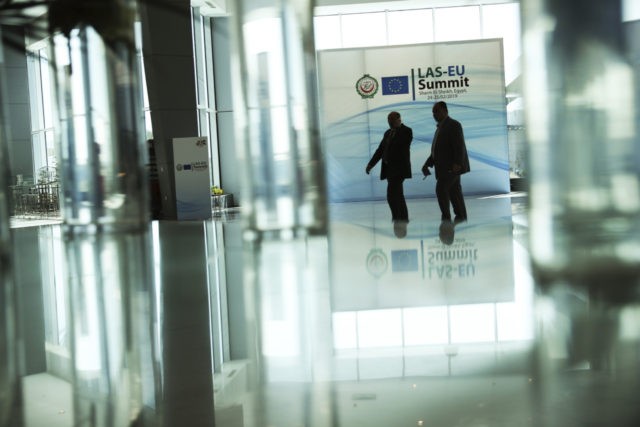SHARM EL-SHEIKH, Egypt (AP) — Leaders from European Union and Arab League countries are holding their first-ever summit, meeting in the Egyptian resort city of Sharm el-Sheikh to discuss migration, security and business deals.
Under tight security on the Red Sea coast, the leaders are likely Sunday to commit to addressing conflicts in Syria and Yemen or stalled Middle East peace efforts, while papering over major differences about how to resolve them or who might be responsible.
Amid this public display of unity, just drafting a summit statement has proved difficult. EU and Arab League foreign ministers failed to agree earlier this month on a text after Hungary objected to the section on migration.
Europe’s migration challenge is at the heart of the two-day meeting, being held under the slogan “Investing in Stability.” Desperate to bring migrant arrivals under control, the EU offered the summit last October as a symbolic sweetener to Egyptian President Abdel-Fattah el-Sissi, much as they did with Turkish President Recep Tayyip Erdogan in 2015.
The EU wants el-Sissi to order the Egyptian coast guard to pick up migrants leaving Libya and take them back to the African mainland, ensuring they do not become Europe’s responsibility. El-Sissi, in turn, receives high-profile European recognition, promotion for Sharm el-Sheikh, and is likely to avoid any lessons on human rights.
While the number of people crossing the central Mediterranean has now dropped to a seven-year low, Europe’s inability to agree on how to manage the arrivals has sparked a major political crisis, as nations bicker over who should take responsibility and whether other EU partners should help out. Some, like Prime Minister Viktor Orban in Hungary, claim that extremists are entering among the refugees.
Just days before the summit, the head of the EU’s border and coast guard agency praised the authorities in Cairo for preventing any migrant from setting out for Europe from the Egyptian coast since 2016.
“There are no boats coming directly from Egypt to the European Union,” Frontex director Fabrice Leggeri said. “The cooperation with Egypt is really encouraging and is developing.”
The EU routinely trumpets an agreement it reached with Erdogan for slowing migrant arrivals to a trickle in exchange for up to 6 billion euros ($7 billion) in aid for Syrian refugees there and other incentives. It has pledged to replicate the deal in northern Africa.
Ahead of this inaugural summit, experts and European officials played down any expectation of major results.
“The timing is very important because it comes after eight years of instability in the Mediterranean affecting Europe and the Middle East,” Saeed Sadek, professor of political sociology at the Canadian University in Cairo told The Associated Press.
“Both sides want to know how can we stabilize the area further, produce stability, how can we deal with the consequences and prevent any further escalations,” said Sadek. “But the imbalance of power between the two sides may not produce the concrete results that people imagine.”

COMMENTS
Please let us know if you're having issues with commenting.